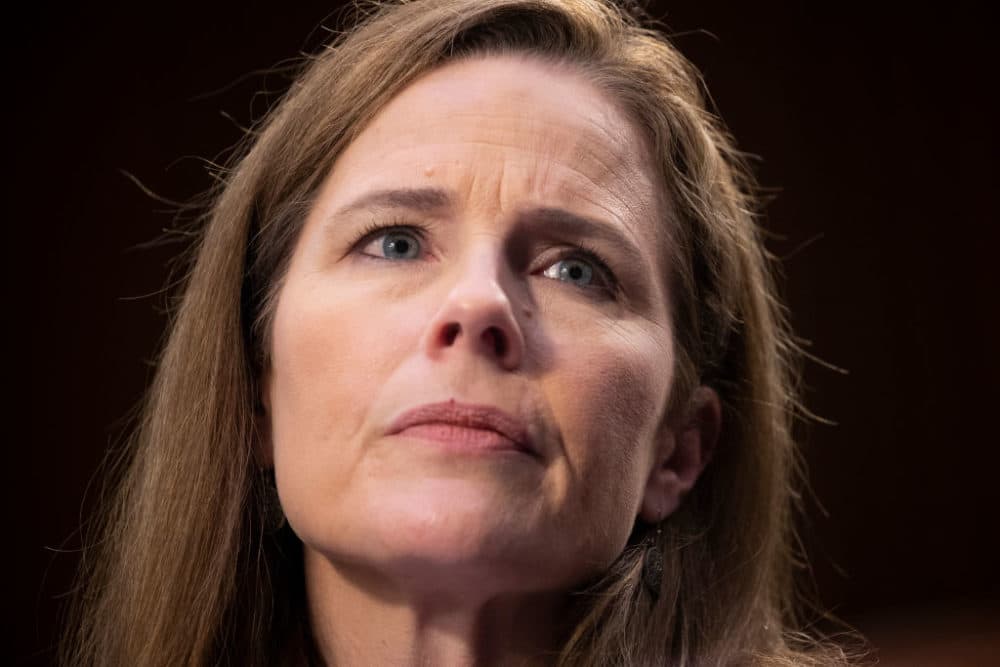Advertisement
Commentary
Amy Coney Barrett's Nomination Is Backed By Dark Money. So Is Her Refusal To Acknowledge Basic Climate Science

“You know, I’m certainly not a scientist.” Those were the first words out of Amy Coney Barrett's mouth when the subject of climate change arose during her confirmation hearing. “I would not say that I have firm views on it,” she continued.
Behind that anodyne response is a legacy of illicit political influence that has undermined the democratic processes of our government and is thwarting efforts to address the climate crisis.
Barrett’s claim of naive neutrality on a subject as weighty as climate change is startling — some would say disqualifying — and yet familiar. The “not a scientist” rejoinder has been the stock-in-trade of many Republicans over the years, including Mitch McConnell.
The nominee would argue that her lack of knowledge or a fixed opinion on climate issues is not a shortcoming because, as a competent textualist, she is capable of interpreting any relevant statutes. Textualism, the theory that laws are to be understood by their literal and ordinary meaning without inferring any implied purpose or hidden intent of the legislators, became prominent during the tenure of Justice Antonin Scalia, for whom Barrett was a clerk.
Regardless of the textualist rigor with which she approaches the cases before her, Barrett, like all judges, is ineluctably influenced by her past.
This includes her upbringing (e.g., her father being an attorney for Shell Oil), her academic experience, her immersion in conservative causes and her affiliation with right-wing organizations, which all serve to steer her views in the direction of a limited-government, anti-regulatory position that has been historically at odds with robust measures to counteract climate change.
Barrett’s predilection for conservative causes drew the attention of the political operatives interested in cultivating a conservative judiciary. This, on its own, is not malign. However, the dubious network that enabled her ascent to the high court — a secretive arrangement of political front groups funded by super-wealthy donors to promote their own interests — is undemocratic at its core, and it does not serve the common good.
Sen. Sheldon Whitehouse (D-RI), a member of the judiciary committee, used his allotted time during Monday’s hearing to lay out this case. Basing his presentation on research from the Center for Media and Democracy, Whitehouse showed that a common set of billionaire donors, shielded by an identity-scrubbing funding organization, administers a three-pronged assault on the judiciary to further their agenda.
First, there is a coordinated effort to solicit and pay for amicus briefs by various organizations, many of them just shells, in support of cases that are critical to the donors’ interests. A parallel effort, the Judicial Crisis Network, is a well-funded public relations organization that promotes the candidacy and confirmation of favored judges.
And then there is the Federalist Society, an ostensibly academic organization that serves as a training camp for conservative jurists, where candidates are recruited, vetted and prepared for the confirmation process. The Trump administration has effectively outsourced the selection of judges for the federal bench to the Federalist Society. Barrett is a member, as are several sitting justices. The judges on the shortlist for the Supreme Court supplied to President Trump all carried conservative bona fides approved by the organization.
And the funders of its $20 million annual budget, largely kept secret, comprise the likes of fossil-fuel giant Koch Industries and the staunchly right-wing Bradley Foundation.
This insidious influence of dark money was further in evidence in Barrett’s confirmation hearings when Sen. Kamala Harris prompted Barrett to offer her opinions on the effects of climate change. Barrett demurred, saying she refused to “express a view on a matter of public policy, especially one that is politically controversial.” Dark money is at the root of that controversy.
[M]any of the same actors that erected the elaborate judiciary-rigging scheme ... are responsible for a disinformation campaign engineered to create doubt and confusion about climate science.
Harris had posed a question about a physical phenomenon — in effect, whether greenhouse gas emissions from burning fossil fuels cause the planet to warm — which is established science. Barrett reflexively conflated that point with the policy question of what the government should do to reduce greenhouse gas levels and prepare communities to adapt to a changing climate. And indeed, Barrett is correct — climate legislation and regulation are contentious public policy matters.
But they’re controversial because many of the same actors that erected the elaborate judiciary-rigging scheme illustrated by Sen. Whitehouse are responsible for a disinformation campaign engineered to create doubt and confusion about climate science.
Kurt Andersen’s recent book “Evil Geniuses” documents how this came about. For example, a secret 1998 memo issued by the American Petroleum Institute argued that the “fossil fuel industry and its allies must make civilians believe there was scientific uncertainty” in order to undermine decisive action on climate change. Other examples abound.
That Amy Coney Barrett regards any question remotely touching on climate issues as a third rail is the end result of orchestrated campaigns to discredit climate science and protect the financial interests of fossil fuel corporations and their billionaire allies. But once Barrett is confirmed and ascends to her lifetime seat on the Supreme Court, she will be obligated to issue opinions on these crucial questions.
We can only hope that, on this matter of existential importance, she possesses the capacity to judge wisely, despite not being a scientist.

